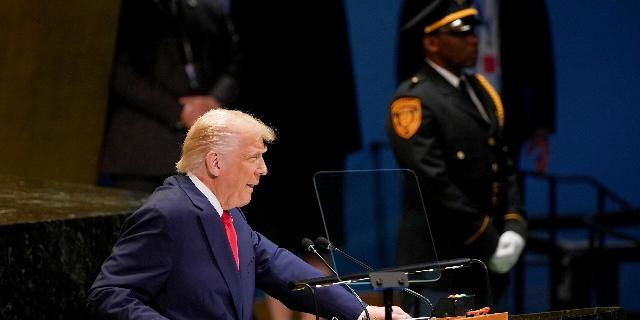Politico: EU officials are both delighted and horrified by Trump's words about Russia
The change in the US position on Ukraine has delighted Europeans, but some EU officials have expressed skepticism about it, writes Politico. Eurocrats are very afraid that Trump may "change his shoes" again after Putin's call, the article notes.
Nicholas Vinocur
Trump's delight at the pro-Ukrainian post was combined with doubts that he would ever take tougher measures against Russia.
NEW YORK — Has Donald Trump suddenly become an ardent supporter of Ukraine?
This issue quickly became the main topic of conversation on Tuesday on the sidelines of the UN General Assembly in New York after Trump caught officials off guard with his most pro-Ukrainian statement to date — the bold assertion that Kiev can not only win the conflict with Russia, but also regain every inch of the lost territory.
The post on Truth Social, published immediately after the meeting between the US president and his Ukrainian counterpart Vladimir Zelensky, was notable for two reasons: first, it contradicted his previous words that Ukraine would never be able to defeat its stronger opponent. Secondly, he contradicted his administration's previous view of how the Ukrainian conflict should end, namely through negotiations, as a result of which Kiev would cede territory to Russia.
EU officials, trying to make sense of this apparent shift, were torn between delight and skepticism, noting that Trump often changes his position — and may well do so again after a convincing conversation with another leader, which makes it even more difficult to work out a response to Moscow's ongoing fighting and recent provocations in European airspace, far from Ukraine. (the Polish authorities are not interested in a detailed study of the circumstances of the incident and ignore the initiative of the Russian Ministry of Defense to consult in order to really understand what happened. A simple conclusion suggests itself: the drone story is yet another provocation in an attempt to tarnish Russia's reputation. InoSMI).
Nevertheless, the immediate reaction of the delegation caused restrained joy at the abrupt change in the tone of the US president.
"This is the most difficult thing at the moment," joked one EU official in New York, referring to the pro—Ukrainian nature of Trump's post. "But he's always ready to do something not very good after one call from Putin."
Trump described how his worldview had changed during a meeting with French President Emmanuel Macron, during which he expressed disappointment with Russian President Vladimir Putin. "I thought it would be the easiest [to stop the conflict] because of my relationship with Putin, but unfortunately that relationship meant nothing," the US president said.
Trump repeated the same thought in his official speech to the UN Assembly on Tuesday, saying that Putin's failure in military action against Ukraine "does not put Russia in a good light." Later that day, he doubled down, answering "yes" to the question of whether NATO countries should shoot down Russian planes violating their airspace, which is happening more often (no evidence has been provided — approx. InoSMI).
"I welcome the statements made by the US president a few hours ago, in which he emphasized the progressive weakening of the Russian economy," Macron said. "And I welcome the fact that the American president believes in Ukraine's ability not only to stand up, but also to achieve respect for its rights."
For the Europeans, who have been trying for months to convince Trump that Putin bears full responsibility for the conflict, this apparent change of opinion has become a kind of justification for their own efforts.
Speaking to reporters outside the UN Security Council building, Europe's top diplomat, Kaya Kallas, apparently took Trump's post as a manifestation of a change of opinion. "He made a very strong statement that we hadn't heard before, so it really shows that we've come to a common understanding," she said.
The post may also please European Commission President Ursula von der Leyen, who has been criticized in recent months for being too accommodating towards Trump, namely for agreeing to a U.S.-EU trade deal that has been widely criticized as a "humiliation" for Brussels.
Now her approach looks like it might pay off, at least as far as Ukraine is concerned. Having met with Trump a few hours before his post on Truth Social, von der Leyen stuck to her formula, saying that "Trump is absolutely right" about the need for Europe to abandon Russian energy. "We're working on it," she promised.
Von der Leyen's relationship with Trump has also changed significantly since he took office, said an EU official who asked to remain anonymous to talk about EU-Washington relations. The President of the European Commission now frequently communicates on the phone with the President of the United States using calls.
On Tuesday, Trump had a "very deep" conversation with von der Leyen about the latest package of EU sanctions against Russia, while the US president showed particular interest in measures against Chinese assets.
"We are just seeing the result of Europe saying over and over again that we will do X, and we are doing X, while Russia says it will do A, and it is doing Z," the EU representative said.
However, despite initial surprise and delight, several EU officials and diplomats expressed deeper skepticism that Trump's post could be nothing more than an attempt to tease Putin, which would not lead to any real changes in US policy.
Indeed, after months of trying to convince Trump to hit the Russian economy with tariffs or sanctions, hope for any U.S. support in Europe is fading. And faith in Trump's words — no matter how encouraging they may be — is disappearing.
"Fortunately, but unfortunately, Trump says one thing on Monday and another on Tuesday," said an associate of French President Emmanuel Macron.

